ITOCHU’s Clean-tech Business
Basic Policy and Strategy
ITOCHU Corporation has established enhancing contribution and engagement with the SDGs including climate change as one of our basic policies in our Brand-new Deal 2023 medium-term management plan. This basic policy is carried over to the Management Policy "The Brand-new Deal" formulated in 2024. We aim to achieve "Offset Zero", where the amount of avoided emissions generated by our clean-tech business exceeds our GHG emissions by 2040. This target is 10 years ahead of the Japanese government’s target. We will achieve this by being the first in the industry to realize a decarbonized society. Furthermore, "The Brand-new Deal" identifies one of the pillars of our strategy to sustainably enhance corporate value as "Grow Earnings - No Growth without Investment," and we aim to expand our business areas.
Climate change and other environmental risks are also clean-tech business opportunities at the same time. We will adopt cutting-edge technologies from a medium- to long-term perspective. We will also take the lead in promoting concrete measures which are expected to lead to sustainable growth in the future and which will contribute to a transformation in social structure toward a decarbonized and circulating society. As a general trading company, our policy is to pursue environmental and economic value at the same time by leveraging our broad value chain and making diversified business investments to increase the overall profitability of our projects. Therefore, we apply the same rigorous investment criteria to the clean-tech business as to other businesses.
We also monitor trends of the amount of avoided emissions from the clean-tech business and the external environment that affects this amount, and review our operation according to the progress of each business and market conditions.
Targets (Transition Plans)
We aim to achieve offset zero* for our greenhouse gas (GHG) emissions by 2040 by proactively promoting business that contributes to a reduction in the amount of GHG emissions (such as clean-tech business).
- Offset zero: When the amount of GHG emissions we contribute to reducing exceeds our GHG emissions
| Business Segment | Individual Targets |
| Renewable Energy |
|
| Fuel Ammonia |
|
| Energy Storage Systems (ESS) |
|
| Water Infrastructure |
|
| Waste Management Project |
|
Initiatives
Top Management Involvement: Decarbonization and Carbon Neutral Task Force
ITOCHU stated a strong commitment to being the first in the industry to realize a decarbonized society by enhancing contribution and engagement with the SDGs in our previous medium-term management plan, Brand-new Deal 2023, and carried it forward into the current Management Policies formulated in April 2024, which serve as a medium to long term compass. At ITOCHU, we launched a decarbonization and carbon neutral task force across companies under the control of President & Chief Operating Officer in April 2021. This task force reports on the details of progress made on initiatives in each Company, in principle, every month. Its field is not limited to hydrogen and ammonia projects; it also discusses other decarbonization projects (such as emissions trading and Carbon dioxide Capture, Utilization and Storage (CCUS)) which will contribute to a reduction in GHG emissions and whose market is expected to grow.
Introduction to Individual Businesses
1. Renewable Energy
ITOCHU globally enhances carbon neutral related businesses such as renewable power, hydrogen and ammonia. We aim to make profit growth not only by focusing on investments, but also by providing multi-angled functions such as engineering, operation and maintenance, etc.
Renewable Energy Generation (Equity Interest Basis)
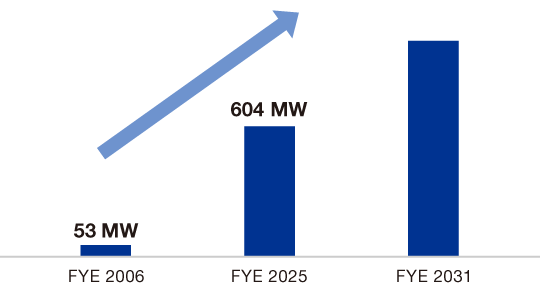
Target for Renewable Energy Ratio of Total Generation (Equity Interest Basis)
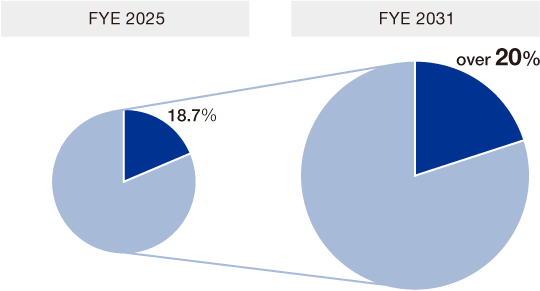
| FYE 2021 | FYE 2022 | FYE 2023 | FYE 2024 | FYE 2025 | FYE 2025 | FYE 2031 (Target) | |
| Generation Capacity on Equity Interest Basis (MW) | Generation Capacity on Equity Interest Basis (MW) | Generation Capacity on Equity Interest Basis (MW) | Generation Capacity on Equity Interest Basis (MW) | Generation Capacity on Equity Interest Basis (MW) | Ratio (%) | Ratio (%) | |
| Wind | 179 |
122 |
164 |
196 |
240 |
18.7% |
20%< |
| Solar/PV Power | 80 |
112 |
132 |
164 |
225 |
||
| Geothermal | 83 |
83 |
83 |
83 |
83 |
||
| Biomass | 33 |
57 |
57 |
57 |
57 |
||
Renewable Energy (Total) |
375 |
373 |
436 |
500 |
605 |
||
| Natural Gas | 1,258 |
1,258 |
1,258 |
1,466 |
1,666 |
81.3% |
80%> |
| Oil-fired Power | 315 |
315 |
315 |
315 |
315 |
||
| Coal-fired Power | 640 |
640 |
640 |
640 |
640 |
||
Thermal Power (Total) |
2,213 |
2,213 |
2,213 |
2,421 |
2,621 |
||
Grand Total |
2,588 |
2,586 |
2,648 |
2,921 |
3,226 |
100% |
100% |
For a list of our renewable energy-related businesses please visit here.
We have announced a policy not to develop any new coal-fired power generation business*.
Renewable Energy Highlights
Wind Power
ITOCHU has continued to invested in wind power generation (onshore and offshore) from the late 1990s. Currently, ITOCHU has interests in seven power plants in Japan, the United States, and Germany.
Offshore Wind Farm in Europe and the United States
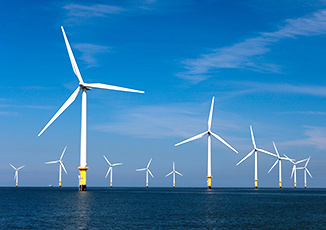
In response to the renewable market growth in Europe, ITOCHU jointly own an offshore wind generation project (288 MW) located on the German North Sea coast with the CITIC group with whom we establish a strategic alliance. The wind farm supplies power to approximately 370,000 standard German households, contributing to the transition to a decarbonized society.
We established a fund in 2023 targeting renewable energy assets in North America. Through this fund, we invested in the first project, the Grandview Wind Power Plant (211 MW), in February 2024. We will continue to solicit investors and plans to conduct a renewable energy project worth approximately US 2 billion dollars through this fund. (Signed an investment agreement for the second investment project (new solar and battery storage assets) in September 2024.)
Aomori Mutsu Ogawara Onshore Wind Farm
ITOCHU is under construction of an onshore wind farm (maximum output capacity: 64.5 MW) in a suitable site with favorable wind conditions in Rokkasho-mura, Kamikita-gun in Aomori Prefecture as a joint project with Kanadevia Corporation and our associated company, Tokyo Century Corporation. We are aiming to start operation in April 2026. We expect this wind farm to generate approximately 166 million kWh of power a year. That is equivalent to the annual power consumption of approximately 46,000 ordinary Japanese households.
Utility Scale Solar Projects
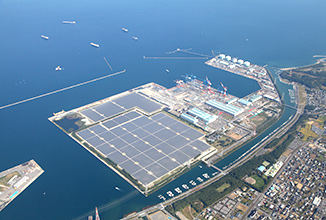
Following on the start of the commercial operation of a mega-solar power plant in Ehime Prefecture in 2015, ITOCHU started operating mega-solar power plants in Oita Prefecture in 2016, Okayama Prefecture in 2017 and Saga Prefecture in 2018. This means we now operate four mega-solar power plants in Japan (total power generation output: approximately 130 MW). The knowledge and experience we have gained through operating these power plants is contributing to the expansion of our renewable energy business. We will continue to operate these power plants stably.
Distributed Solar Power Supply Business
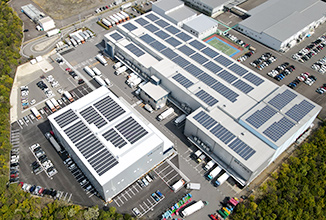
ITOCHU operates one of the largest on-site distributed power plants in Japan mainly involving the roofs of supermarkets and logistics facilities through our capital and business alliance partner of i GRID SOLUTIONS, Inc. (i GRID). i GRID is involved in the on-site solar power generation business. The company installs self-consumption solar power generation systems at zero initial investment by customers. It then directly supplies power at low cost to facilities over a long period of time. Furthermore, in addition to solar power generation, it integrates and controls distributed power supplies such as storage batteries and electric vehicles with a supply and demand adjustment platform using AI. This allows it to offer solutions for the realization of green transformation in regions centered on customer facilities.
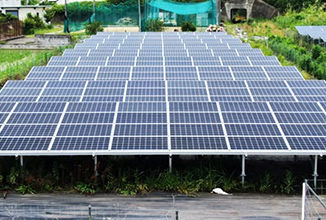
Furthermore, we have entered into a capital and business alliance with Clean Energy Connect Co., Ltd. (CEC) for initiatives to contribute to clean energy by effectively utilizing land in Japan. We have been jointly promoting this business since 2021. CEC is involved in the off-site solar power business. The company develops and owns multiple small and medium-sized solar power plants by utilizing idle land in Japan. It then bundles together green power to supply electricity and environmental value over the long-term to customers such as office buildings in the center of cities, contributing to their decarbonization and RE100 targets. By FYE 2025, we have introduced solar power plants with “additionality” at approximately 2,000 locations in Japan. These solar power plants are widely distributed across 293 municipalities in 24 prefectures nationwide, aiming to stabilize power generation fluctuations due to weather and mitigate risks such as disasters through a diversified power plant portfolio. The total power generation is expected to be 188 million kWh per year, with CO2 reductions amounting to 79,000 tons of CO2 annually.
Solar Panel Recycling Business
ITOCHU undertook a capital increase through a third-party allotment from ROSI SAS. – a French company engaged in the reuse and develops and owns advanced solar panel recycling technologies, and ITOCHU has entered into these alliances with the aim of promoting and expanding the solar panel recycling business.
In recent years, there is widespread global concern that mass disposal of solar panels that have reached the end of the product lives will occur in the near future. Establishing an appropriate recycling chain for these waste solar panels represents a major challenge for the future, in order to introduce sustainable renewable energy solutions for creating a decarbonized society.
We will contribute to the establishment of a recycling chain for solar panels by combining solar power generation-related business know-how and networks developed by us so far with ROSI’s advanced and highly economical recycling technologies.
Geothermal Power
ITOCHU participates in Sarulla Geothermal Power Project in Indonesia, which is one of the largest size in geothermal sector. The project entered into construction phase after signing a 30-year power purchase agreement with Indonesia’s state-owned electricity company in 2013. The first and second units were completed and commenced commercial operation in 2017, followed by the third unit in 2018. Indonesia is actively promoting renewable energy, and geothermal is positioned as an important part of it. Among renewable energy, geothermal energy is able to provide stable power supply to the electricity grid through a whole day, not dependent on the natural conditions such as wind or sunlight. ITOCHU is proceeding with decarbonization through stable power supply in line with energy mixes and policies of each country or area.
Biomass Power
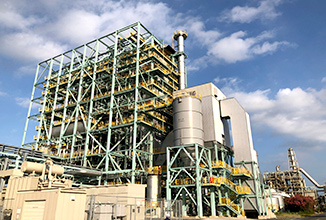
The Ichihara Biomass Power Plant (power generation output: 49.9 MW) in which ITOCHU is participating started commercial operation in December 2020. We expect this power plant to generate approximately 350 million kWh of power a year. That is equivalent to the annual power consumption of approximately 120,000 ordinary Japanese households. In addition, Hyuga Biomass Power Plant (power generation output: 50 MW) in which ITOCHU participates has begun commercial operation in Hyuga in Miyazaki Prefecture in October 2024. Additionally, in Tahara in Aichi Prefecture, a biomass power plant (power generation output: 50 MW) is under construction and scheduled to start operation in FYE 2026.
Biomass Fuel and Renewable Fuel Related Business
Sustainable Aviation Fuel (SAF)
ITOCHU is working to increase the ratio of renewable energy through the supply of biomass fuels to power generation companies in Japan. We are also working to expand procurement and supply of renewable fuels for the decarbonization of the mobility market, including airplanes and automobiles.
For example, in response to the accelerated decarbonization of the airline industry, we were the first company in Japan to begin selling Sustainable Aviation Fuel (SAF) to airline companies. We are also the first Japanese trading company to obtain ISCC CORSIA certification, which was developed to reduce GHG emissions in the airline industry. This is a certification that proves we are able to supply SAF which meets the carbon offset requirements of CORSIA. We deliver the renewable fuels made from non-fossil-derived raw materials, contributing to a significant reduction in GHG emissions compared to conventional petroleum-derived fuels.
In May 2023, ITOCHU has signed a trademark licensing agreement and a collaboration agreement for brand enhancement with Neste OYJ, the world's largest renewable fuel manufacturer. The purpose of these agreements is to expand the distribution of their renewable diesel, 'Neste MY Renewable Diesel,' within Japan.

Copyright: All Nippon Airways co., Ltd. all rights reserved
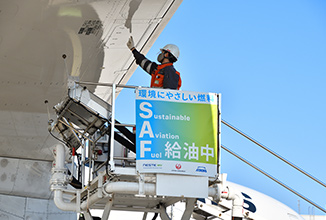
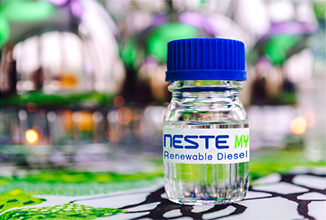
Copyright: Neste MY Renewable Diesel
Operation and Maintenance for Renewable Power in North America
ITOCHU provides operation and maintenance service as well as asset management for solar, battery storage and wind generation (totaling 3,000 MW) in the US principally through our subsidiary NAES Corporation. It serves approximately as many as 1,400 sites throughout the US utilizing its remote monitoring system.
Renewable Power Developments in North America
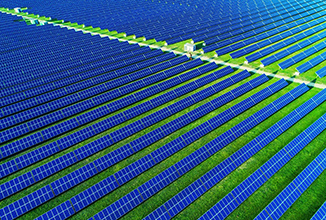
Tyr Energy Development Renewables, LLC (TED), dedicated in greenfield renewable energy development in the United States, was established in 2022 and is currently developing renewable energy projects of approximately 5,000 MW. TED has full suite function of greenfield development including land acquisition, permitting, interconnection process, PPA origination, engineering and finance. The U.S. renewable energy market is expected to grow significantly over the next 20 years. To capture the growth, we continue to enhance the development activities.
2. Fuel Ammonia
With international momentum towards the transition to a decarbonized society, the International Maritime Organization (IMO) has set a GHG emissions reduction strategy of 40% efficiency improvement from 2008 levels by 2030, 50% total volume reduction from 2008 levels by 2050. In 2023, the strategy was revised to the ambition to reach net zero of GHG emissions (zero emissions) by or around 2050. In order to achieve these goals, early development and social implementation of zero-emission ships are expected, and ammonia is attracting attention in various fields as a candidate alternative fuel. In addition, a stable supply of ammonia fuel for marine use and the development of supply bases are indispensable elements for the concrete development of ships that use ammonia as their main fuel.
Development of Ammonia Fuel Ship
ITOCHU has agreed with Nihon Shipyard Co., Ltd., Mitsui E&S Machinery Co., Ltd. (Currently, Mitsui E&S Co., Ltd.), ClassNK, ITOCHU ENEX Co. Ltd., and MAN Energy Solutions (MAN) on jointly developing commercial ships equipped with a main engine that uses ammonia as its main fuel, which is under development by MAN.
In October 2021, we applied for “the Green Innovation Fund Project / Development Project for Next-Generation Ships / Development of an Ammonia Fueled Ship Project” publicly offered by the New Energy and Industrial Technology Development Organization (NEDO), together with four other companies, including Kawasaki Kisen Kaisha, Ltd., NS United Kaiun Kaisha, Ltd., Nihon Shipyard Co., Ltd. and Mitsui E&S Machinery Co., Ltd. (Currently, Mitsui E&S Co., Ltd.), and successfully selected. In November 2022, ITOCHU and the said four companies obtained Approval in Principle for the basic design of an ammonia-fueled ship (200,000 deadweight ton type bulk carrier). This project aims to take the lead in the development of propulsion systems and hulls, as well as the ownership and operation of ammonia-fueled ships, as early as possible before 2028.
Development of Supply Chain of Ammonia Bunkering
ITOCHU has been promoting the development of ammonia fuel supply all over the world. In Singapore, we were selected as one of the bunkering players by the Maritime and Port Authority of Singapore in July 2024. For the joint development of an ammonia bunkering, we have signed in 2023 a Memorandum of Understanding (MOU) with Peninsula Petroleum in Spain and also an MOU with Orascom Construction PLC in the Suez Canal. We will be further accelerating the development of a safe fuel supply system and the development of ammonia bunkering vessels.
Since June 2021, ITOCHU has continued to examine and verify common issues related to the use of ammonia as marine fuel through the “Joint Study” a framework established with 34 companies and organizations to promote the use of ammonia as marine fuel. In April 2022, we launched the “Joint Study Framework for Ammonia Bunkering Safety” with 16 companies and organizations as a framework to share issues and knowledge on safety and guidelines for ammonia bunkering among related parties, and are expanding the activities. As a successive phase of these activities, we have executed an MOU for the Joint Study of Ammonia Bunkering Safety for an Ammonia-fueled Container Carrier among eight companies and organizations in September 2023. All three Joint Study frameworks were concluded at the end of March 2024 and ITOCHU has transitioned to working on individual projects.
Each of the above joint developments and frameworks is positioned as part of an “Integrated Project” of ITOCHU and partner companies that includes not only the development of ammonia fuel ships and the establishment of an ammonia fuel supply base in Singapore, but also the ownership and operation of these ships, the procurement of ammonia fuel for marine use, and the establishment of a global supply chain. We will work with domestic and overseas companies and relevant ministries and agencies to contribute to the reduction of GHG emissions from international shipping.
Project to Manufacture and Sell Clean Ammonia in Canada, Aiming to Realize a Decarbonized Society
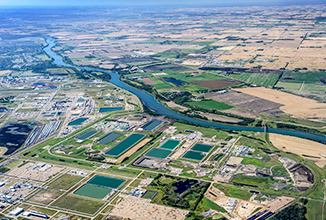
ITOCHU and Gentari Hydrogen Sdn. Bhd., Petroliam Nasional Berhad group, a Malaysian national oil company, have been conducting detailed studies of a project to manufacture and sell clean ammonia in Alberta, Canada.
ITOCHU will pursue the creation of a decarbonized society by establishing manufacturing sites and a supply chain for clean ammonia, which is expected to reduce GHG emissions from conventional fossil fuel derived ammonia.
3. Hydrogen Related Business
In December 2020, Japan announced the “Green Growth Strategy Towards 2050 Carbon Neutrality,” and as part of that strategy, hydrogen is expected to contribute to the decarbonization of various fields as a key technology for carbon neutrality with promising applications across a wide range of fields, such as power generation, industrial usage, transportation, etc.
In light of this major trend, ITOCHU’s wide-ranging networks focused on consumer-related sectors will be used to demonstrate the comprehensive capabilities of the ITOCHU Group and promote the development of the hydrogen market.
Strategic Collaboration to Build a Hydrogen Value Chain

ITOCHU, Air Liquide Japan G.K. and ITOCHU ENEX Co., Ltd. will jointly examine hydrogen production/supply and hydrogen station business focused on major metropolitan areas in Japan. The aim of this is to cultivate the hydrogen market for mobility and industry.
Starting with the Hydrogen Refueling Station (HRS) in Motomiya-city, Fukushima Prefecture, which had started operation in May 2024 as Japan’s first HRS, we will continue to find out more HRS opportunities with similar concept that are expected to be rolled out along with highway and to attract usage of larger scale fuel cell commercial vehicles.
We will demonstrate our comprehensive strengths as a Group by making full use of our extensive network focused on the consumer goods industry field to contribute to the growth of the hydrogen market.
Business Model Development of a Local Hydrogen Production for Local Consumption
ITOCHU is considering the joint operationalization research on a hydrogen business based on “the local production for local consumption model” in northern Kyushu with our important customers of Nippon Coke & Engineering Company, Limited (Nippon Coke) and Compagnie Maritime Belge B.V. (CMB). We have been supplying raw materials to Nippon Coke, and also has a lot of newly built ship business with CMB which is the largest maritime group in Belgium, both for many years.
Featuring both the hydrogen derived from waste plastic of Nippon Coke and the hydrogen engine of CMB, this project aims to create and expand both supply of and demand for hydrogen, with the goal of realizing actually operating hydrogen supply chains based on “the local production for local consumption model”. Furthermore, by actively deploying this business model in other regions as well, ITOCHU will realize the social implementation of hydrogen on a global scale at the possible earliest time, for enhancing our contribution to and engagement with the SDGs.
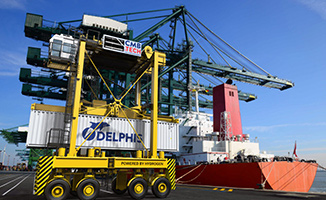
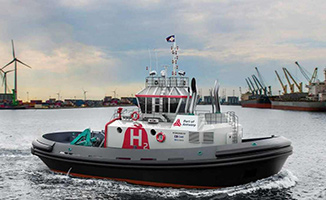
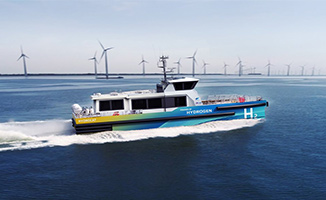
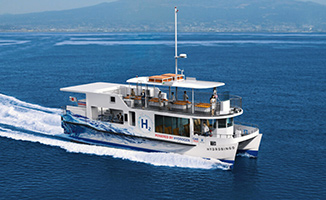
Green Hydrogen Production Project with Everfuel of Denmark
In December 2023, ITOCHU and a subsidiary of Osaka Gas Co., Ltd. have entered into a joint agreement to acquire shares of Everfuel A/S, which promotes the establishment of a green hydrogen value chain. The company is engaged in the EPC and operation of green hydrogen production facilities, transportation equipment, and hydrogen stations using water electrolysis equipment. The company is also promoting the construction of a green hydrogen value chain for local production and consumption by selling hydrogen to the industrial and mobility sectors through the use of its own hydrogen stations. The world’s largest hydrogen production and distribution plant (20 MW electrolyzer scale) has started commercial operation in February 2025 as the company’s first hydrogen production project.
ITOCHU aims to horizontally expand the local hydrogen production and consumption business to Europe and other regions and to enter into the business of producing hydrogen-derived products by utilizing the knowledge and expertise gained through this project, while contributing to the realization of a decarbonized society.
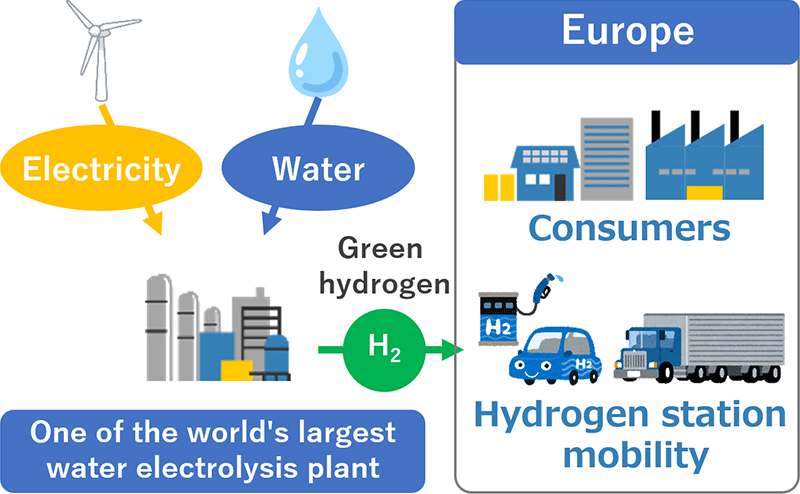
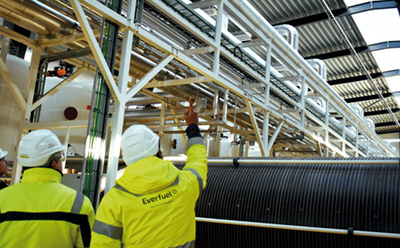
Investment in ZeroAvia, Distribution Agreement in Asia, and Strategic Partnership for Hydrogen Infrastructure Development and Maintenance System Establishment
In 2024, ITOCHU has invested in ZeroAvia, Inc., a US-based company engaged in the development and manufacturing of hydrogen-electric engines for aircraft. Additionally, we have signed a representative agreement for Asia and a Memorandum of Understanding with ZeroAvia to jointly promote the establishment of maintenance systems, airport infrastructure, and hydrogen infrastructure, with the goal of achieving decarbonization in the aviation sector. ZeroAvia is developing hydrogen-electric engines with extremely low environmental impact. In 2023, the company successfully conducted a demonstration flight using its engine installed on a 19 seat Dornier 228 aircraft. The company aims to obtain engine certification for 9 to 19 seat aircraft by 2026, 40 to 80 seat aircraft by 2028, and eventually for 200 seat aircraft in the future. Compared to conventional jet fuel engines, hydrogen-electric engines can reduce GHG emissions by more than 90%. Additionally, they have fewer components and are expected to reduce operating costs by approximately 40% compared to traditional jet engines. Collaborating with aircraft manufacturers, energy companies, and airport operators, the company has already secured pre-orders for over 2,000 engines.
To support the commercialization of ZeroAvia’s hydrogen-electric engines, which contribute to decarbonization in the aviation industry, ITOCHU will collaborate with hydrogen infrastructure partners and airlines both domestically and internationally. Through these efforts, we aim to contribute to the realization of sustainable local communities and the reduction of environmental impact on a global scale.


4. Energy Storage Systems (ESS)
ITOCHU aims to promote decarbonization and reduce environmental footprint by selling energy storage systems (ESS) that enhance and optimize the sustainable supply of renewable energy. As a demonstration of our commitment, we have set a clear sales target for ESS of 20 billion JPY per year and a cumulative energy storage around 2GWh by FYE 2031.
Moving forward, ITOCHU will strengthen our global battery procurement including reusable batteries and dealer network, in order to accelerate the development of energy storage systems for households and industries, and the development of systems for utility scale energy storage that connect renewable energy businesses and consumers for contribution to the decarbonization of each business. We will look to develop AI-equipped energy storage systems and to then launch them onto the market, and will develop businesses that provide solutions tailored to local markets (especially, we assume, the USA and Australian markets which are expected to grow in the future) with capital and business alliance partners overseas. Moreover, we will accelerate efforts to recycle waste batteries generated by electric vehicles (EVs) or energy storage systems and efforts relating to the traceability of those. This will allow us to develop our recycling-orientated business and to contribute to a further improvement in corporate value.
Sales and Cumulative Energy Capacity of Our ESS Products
Cumulative Capacity of ESS Units Sold (GWh)
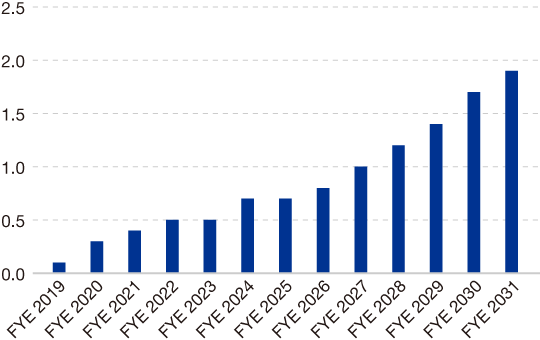
In cooperation with business partner, ITOCHU developed Smart Star ESS series, which have been sold for approximately 60,000 units as of January 2025.
We have also begun to build up a track record of installations of Bluestorage, an energy storage system for C&I and grid use, centered on the utility scale energy storage project being promoted by the Japanese government and the Tokyo Metropolitan Government to realize a decarbonized society.
Other Initiatives
The Sale of Next-generation Residential ESS Products Using AI Technology
ITOCHU has entered into a capital and business alliance with Moixa Energy Holdings Ltd. in the United Kingdom, which develops “GridShare,” software for optimal charge/discharge control of power storage systems.
By incorporating GridShare into the Smart Star series, in addition to the original features that demonstrate its strengths during power outages, AI analyzes and learns weather forecasts, user power demand and power generation forecasts, etc., and performs optimal charge and discharge control of the storage system. This enables efficient operation of solar power generation and power storage systems.
In addition, “Smart Star 3”, which went on sale in May 2021, is equipped with the world’s first environmental value point conversion and EV charging function through a home power storage system.
Official website of Smart Star Series: Click here (Japanese only)![]()
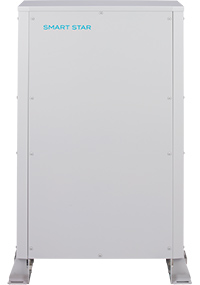
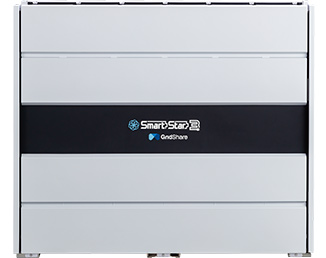
Equity Participation in TRENDE Inc. and Future Collaboration
With the mission of "lighting up the future," TRENDE Co., Ltd. develops residential solar power retail services (Hotto Denki, Hidamari Denki, Jibun Denryoku) with zero initial cost, and promotes the efficiency of renewable energy. We are working on technological development and social implementation of P2P power trading*1 that contributes to its practical use and spread.
ITOCHU and TRENDE aim to expand environmental value transactions utilizing the non-fossil value*2 of renewable energy and realize P2P electricity transactions between customers.
- P2P power trading: Abbreviation for Peer to Peer. Refers to direct transactions of electricity between electricity consumers and power generation facility owners.
- Non-fossil value: Environmental value given to power sources that do not use fossil fuels for power generation. A trading market was established in May 2018 to promote the introduction of renewable energy.
Operation of a Fund Exclusively for Utility Scale Energy Storage for the First Time in Japan Promoting Energy Generation and Storage
As activity in the development of renewable energy increases, it is increasingly necessary to develop functions for the adjustment of supply to meet demand for renewable energy as their output fluctuates greatly. Utility scale energy storage, which can provide power grids with the ability to adjust energy supply to meet demand, is essential for the future carbon-free society. The Tokyo Metropolitan Government has decided to create a government-industry fund to accelerate the ubiquitization of utility scale energy storage which contributes to the stabilization of power grids.
ITOCHU was selected, jointly with Gore Street Capital Limited, as the co-manager of the fund for promoting energy creation and storage being created by the Tokyo Metropolitan Government. This fund is the first in Japan that is intended exclusively for utility scale energy storage, following the establishment of similar funds in Europe and the United States. The fund came into full operation after investment of more than 8 billion yen from private institutional investors.
The fund has goals of making maximum use of renewable energy power sources, stabilizing power demand and supply, enlarging the energy storage plant market and establishing a finance model. With capital participation from many different business sectors including real estate, services, automobiles and finance, the fund will work with these partners to achieve these goals.
Strategic Business Alliance with Akaysha in the Utility Scale Energy Storage Development
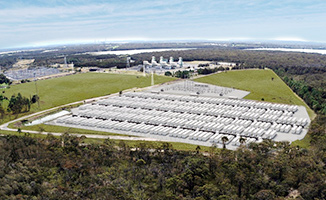
ITOCHU and Akaysha Energy Pty (Akaysha) have entered into a strategic alliance agreement to strengthen our competitiveness in the development of high-performance and efficient grid storage battery systems. Akaysha is a business development platform owned by a fund managed by BlackRock group, and promotes the development, ownership and operation of grid storage solutions globally. Through this collaboration, we will combine our innovative solutions to contribute to the further introduction and stable supply of renewable energy and play a role in the realization of a sustainable society.
5. Water Infrastructure
ITOCHU identifies water-related businesses as a strategic priority. This is due to our understanding that such demands will increase given global climate change trends projecting drastic changes in rainfall as well as changes in demography especially in emerging economies. We globally engage in water-related businesses such as seawater desalination and water utility, aiming to contribute solutions to the increasing water problems around the world.
Seawater Desalination
We have invested in a seawater desalination project in Victoria, Australia. This is the project that has been providing the reliable water supply for Melbourne since 2012, and this plant is capable to meet approximately 30% of the water need of Melbourne, Victoria. We have invested as the largest shareholder in a seawater desalination project with the Oman Power and Water Procurement Company (OPWP), a government entity of the Sultanate of Oman. OPWP is promoting this project at Barka, in the northern area of the country.
Other Initiatives
The Development and Sales of Seawater Desalinization Plants and Reverse Osmosis Membranes
Stable Supply of Life-sustaining Water
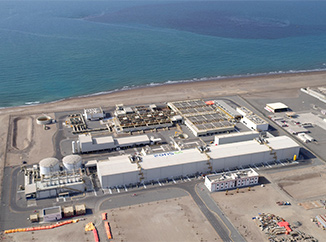
– Largest Seawater Desalination Project in Oman –
In March 2016, Barka Desalination Company, in which ITOCHU has invested, agreed a contract to build and operate a new seawater desalination plant with a capacity of 281,000 m3 per day at Barka, located in the northern area of the Sultanate of Oman, with the aim of ensuring a stable supply of water in the country. This project is a public-private partnership project with the Oman government to provide water for everyday life to the Barka region that suffers from severe water stress. The facilities involved use reverse osmosis membrane (RO membrane) to desalinate the water and are projected to operate for 20 years. It is the largest seawater desalination project in Oman with a total project cost of approximately 300 million US dollars. The plant has started commercial operation in June 2018. Besides, we realized listing on the Muscat Stock Exchange in February 2022.
6. Waste Management Project
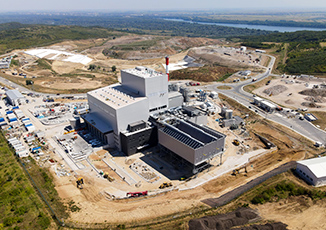
All over the world, 2.0 billion tons of municipal solid waste (equivalent to 5,400 times of Tokyo Dome) are discharged annually. At least one-third of this waste is not treated with a proper way. As a result, decomposing gases emitted from waste cause fires, and the toxic substances that flow from waste mix with lakes, rivers, and groundwater, having a negative impact on the health of people and ecosystems in the surrounding areas. Due to rapid urbanization and population growth, especially in emerging countries, the world’s waste volume is expected to reach 3.4 billion tons per year over the next 30 years.
ITOCHU is involved as a developer, investor, and operator in three energy-from-waste projects for municipal governments in the United Kingdom, which together treat 850 thousand tons of waste annually and generate enough electricity to power 100,000 British households. In the Republic of Serbia, we are working with the government of Serbia and City of Belgrade to develop a waste management project with an energy-from-waste facility. The project will address one of the biggest environmental and social problems in Serbia - closing and remediating the existing landfill at the Vinca dumpsite, and treat municipal solid waste in City of Belgrade, and generate electricity. Financed by International Finance Corporation (IFC), the European Bank for Reconstruction and Development (EBRD) and Oesterreichische Entwicklungsbank (Austria’s Development Bank “OeEB”), an energy-from-waste facility completed construction and commenced commercial operation as of July 2024. This project will treat 340,000 tons of waste annually and generate enough electricity to power 30,000 households.
In addition to these projects, ITOCHU has started an energy-from-waste project in the Emirate of Dubai, the United Arab Emirates in 2020, completed construction and commenced commercial operation as of August 2024. This project will be one of the largest energy-from-waste projects in the world, which will treat 1.9 million tons of waste annually, accounting for about 45% of the municipal solid waste in UAE, and generate electricity. This project will contribute to reaching the goals set by Dubai Municipality in minimizing the volume of municipal waste in landfills and developing alternative energy sources as well as contribute to sustainable and ecologically friendly waste management.
7. Low-carbon Iron Supply Chain
Creating a Low CO2 Emission Supply Chain for Ferrous Raw Material
Reducing CO2 emissions during the steelmaking process has become an urgent issue in the steel industry. The direct reduction route is a ironmaking process that can significantly reduce CO2 emissions in the steelmaking process compared to the conventional blast furnace route by using high-grade iron ore, which has high iron content, as the raw material and natural gas for its reduction.
ITOCHU is conducting a feasibility study on establishing a low CO2 emission supply chain for ferrous raw material jointly with JFE Steel Corporation, who is our long-term business partner and EMSTEEL, the largest steel and building materials company in the UAE. On the whole, blast furnace route emits approximately 2 tons of CO2 per ton of steel, whereas the direct reduction route effectively reduces this to about 1 to 1.5 tons of CO2 emissions* with access to abundant natural gas. Looking ahead, we aim to achieve zero CO2 emissions in the steelmaking process by implementing hydrogen reduction.
In this venture, we plan to utilize high-grade iron ore produced by CSN Mineração S.A. (CM), a superior iron ore producer in which ITOCHU has invested. In November 2024, we made an additional investment in CM. The Casa de Pedra mine owned by CM is a rare, operating mine that can produce high-grade iron ore on a large scale and at low cost. Through this additional investment, we will strengthen our cooperative relationship with CM to develop and expand its production system, thereby building a low CO2 emission supply chain for ferrous raw material.
In addition to this, we have been participating in an iron ore project in Canada since 2022, producing high-grade iron ore which is essential for the production of reduced iron.
- JFE Environmental Vision 2050, page 9

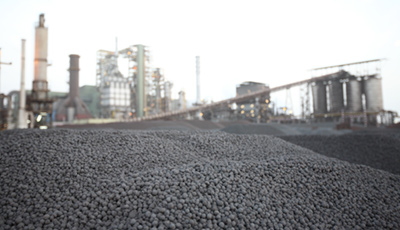
8. CCUS/Carbon Fixation
Mineral Carbonation Project with MCi of Australia

(photo taken in January 2025)
ITOCHU invested in the Australia-based company, MCi Carbon Pty Ltd (MCi), and has been collaborating with MCi in promoting its technology which produces carbon embodied products by combining steelmaking slag (by-products of the steelmaking processes), waste concrete and/or serpentinite with CO2, to utilize as building materials. MCi, established in October 2013, is a pioneer in this field, aiming at the fixation of 100 million tons of CO2 annually in the future, as its company mission.
In July 2022, ITOCHU, TAISEI CORPORATION, and MCi concluded a Memorandum of Understanding (MoU) and are proceeding with verification of the use of these carbon embodied products as raw materials for concrete. In January 2025, ITOCHU, Mitsubishi UBE Cement Corporation, and MCi concluded a MoU with the aim of establishing a supply chain such as construction of a manufacturing plant, securing feedstocks and sales of raw materials in Japan. MCi and ITOCHU are also in discussions with other CO2 emitters and raw material suppliers both in Japan and foreign countries for commercialization.
MCi already has a pilot plant for testing and is currently constructing a demonstration plant in Newcastle that will be fully automated and capable of continuous operation, with plans to begin full-scale operation in June 2025, processing more than 1,000 tons of CO2 per year. Thereafter, the company aims to build its first commercial plant in Austria around 2028.
About a Study and Design Work Contract Related to an Advanced CCS Project
A joint proposal by ITOCHU (lead company), NIPPON STEEL CORPORATION, TAIHEIYO CEMENT CORPORATION, Mitsubishi Heavy Industries, Ltd., INPEX CORPORATION, TAISEI CORPORATION, and ITOCHU Oil Exploration Co., Ltd. for the Tohoku Region West Coast CCS Initiative has been selected for the “Survey for the Implementation of Advanced CCS Projects” for FYE 2024 and the "Design Work Related to Advanced CCS Projects" for FYE 2025 by the Japan Organization for Metals and Energy Security (JOGMEC).
CCS (Carbon dioxide Capture and Storage) is positioned as a means for decarbonization that should be fully harnessed to achieve two targets set by the Japanese government: carbon neutrality in 2050 and a 60% reduction in GHG emissions (from the FYE 2014 level) in FYE 2036, and ITOCHU is committed to focusing on its social implementation.
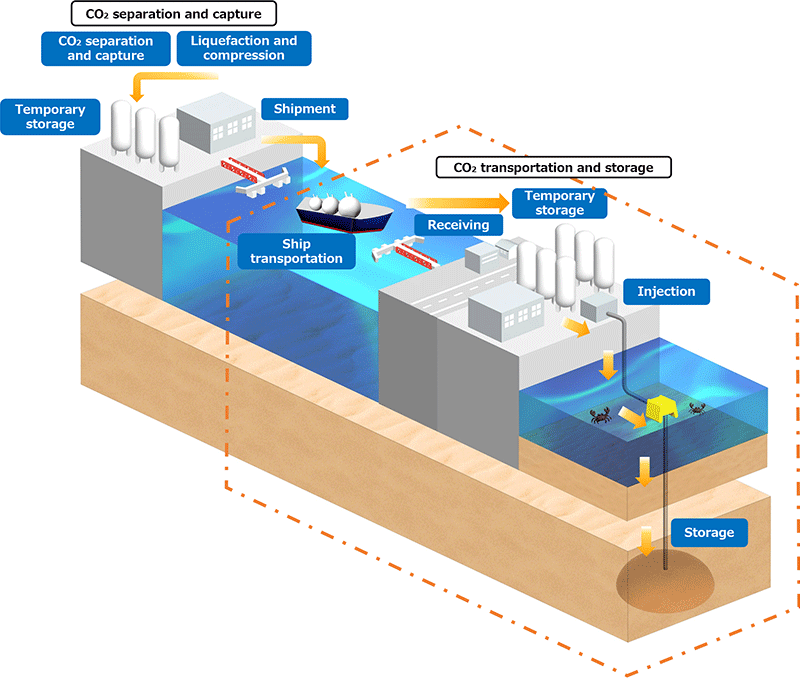
9. Green Buildings
ITOCHU’s construction and real estate group is committed to providing real estate and distribution services, especially in housing and commercial facilities as well as distribution facilities and housing complexes, which are sustainable and relevant to everyday life. We aim to do so by being involved throughout the value chain, from the development to the operation and management of real estate products, to streamline and optimize the solutions where we can, utilizing smart city concepts and emerging technologies such as IoT.
Our Group’s real estate investment trust (REIT) participates in the GRESB Real Estate Assessment, a sustainability assessment framework for real estate investors. We are actively acquiring green building certification* for our real estate portfolio from the perspective of reducing their environmental impacts. Advance Residence Investment Corporation, a listed residential real estate REIT has 27 real estate assets with CASBEE real estate valuation certifications, one real estate asset with DBJ Green Building certification, and four real estate assets with Building-Housing Energy-efficiency Labeling System (BELS) certification which accounts to 33.1% in surface area, and 10.7% in number of units among its entire portfolio. At Advance Private Investment Corporation, an unlisted open-ended REIT, we own three real estate assets with CASBEE real estate valuation certification, which accounts to 37.7% in surface area, and 21.4% in number of units among its entire portfolios.
- Each figure is information as at end of January 2025.
10. Collaboration with Outside Initiatives
ITOCHU is promoting and expanding initiatives for clean-tech business by participating in initiatives. We decide to participate in each initiative upon confirming it conforms to our basic policy and initiatives for the clean-tech business.
Carbon Recycling Fund Institute
The Carbon Recycling Fund Institute, a general incorporated association established in August 2019, believes that further efforts are necessary to achieve carbon neutrality by 2050 by using CO2 as a carbon source. The institute aims to simultaneously solve the problem of global warming and improve energy access around the world. It supports the creation of carbon recycling innovation through research assistance and publicity activities related to carbon recycling, with ITOCHU also participating as a member.
Japan CCS Co., Ltd.
In response to the national policy to develop and promote CCS technology, Japan CCS Co., Ltd. (JCCS) was established in May 2008 by a group of major companies with expertise in CCS-related fields, including electric power, petroleum, oil development, and plant engineering. JCCS is a company founded and dedicated explicitly for developing the integrated CCS technology, and conducting feasibility studies and demonstration projects in Tomakomai area, Hokkaido, pertaining to carbon dioxide capture, utilization, transportation and storage technologies. As one of the shareholders, ITOCHU has been supporting this project. Also, separate from this project in Hokkaido, We are jointly conducting research and demonstration project of NEDO to establish liquefied CO2 ship transportation technology with JCCS as the consortium partners.
The Association for Reciprocal Revitalizations of Renewable Energy and Region (FOURE)
The Association for Reciprocal Revitalizations of Renewable Energy and Region (FOURE) was established in June 2021. It is an organization aiming to expand the introduction of renewable energy that benefits regions and to realize a decarbonized society. The organization is achieving this aim by spreading the introduction of renewable energy as the main power source in regions in Japan and by regions and renewable energy coexisting and mutually developing. ITOCHU has been participating as a member since March 2022.
Japan Sustainable Fashion Alliance
The Japan Sustainable Fashion Alliance was established in August 2021 with ITOCHU serving as the first representative alongside GOLDWIN INC. and JEPLAN, INC. The purpose of this alliance is to promote a transition to a sustainable fashion industry with targets of zero fashion loss through appropriate production, appropriate purchasing and recycling, and carbon neutrality in 2050. The alliance will realize its purpose by understanding the impact the fashion industry has on the natural environment and society to come up with solutions jointly for shared issues in the fashion and textile industries.
| Details of Effort | Name of Business / Investment Project | Country | Generating Capacity / Size | Estimated GHG Reduction Figures (Project 100% Basis) |
| Wind | Aspenall Wind Power Project |
USA |
43 MW |
100,000 t/year |
Cotton Plains Wind Power Project |
USA |
202 MW |
480,000 t/year |
|
Prairie Switch Wind Power Project |
USA |
160 MW |
380,000 t/year |
|
Grandview Wind Power Project |
USA |
211 MW |
500,000 t/year |
|
Bowman Wind Power Project |
USA |
209 MW |
500,000 t/year |
|
Mutsu Ogawara Wind Power Project |
Japan |
64.5 MW |
150,000 t/year |
|
| Offshore Wind | Butendiek Offshore Wind Power Project |
Germany |
|
750,000 t/year |
| Waste Management | ST&W Waste Management Project / South Tyne & Wear Energy Recovery Holdings Limited |
UK |
|
60,000 t/year |
Cornwall Waste Management Project / Cornwall Energy Recovery Holdings Limited |
UK |
|
60,000 t/year |
|
West London Waste Management Project / West London Energy Recovery Holdings Limited |
UK |
|
80,000 t/year |
|
Serbia Waste Management Project / Beo Cista Energija |
Serbia |
|
100,000 t/year |
|
Dubai Waste Management Project / Warsan Waste Management Company P.S.C. |
UAE |
|
1,090,000 t/year |
|
| Geothermal | Sarulla Operations Ltd |
Indonesia |
330 MW |
2,150,000 t/year |
| Solar | Cotton Plains Solar Power Project |
USA |
15 MW |
20,000 t/year |
Rosamond South Solar and Storge Battery Project (Under Construction) |
USA |
140 MW |
150,000 t/year |
|
Rooftop Solar Projects |
Vietnam |
15 MW |
20,000 t/year |
|
Oita Hiyoshibaru Solar Power Plant |
Japan |
45 MW |
50,000 t/year |
|
Shin-Okayama Solar Power Plant |
Japan |
37 MW |
40,000 t/year |
|
Saijo Komatsu Solar Power Plant |
Japan |
26 MW |
30,000 t/year |
|
Saga-Ouchi Solar Power Plant |
Japan |
21 MW |
20,000 t/year |
|
i-Grid Solutions, Inc. |
Japan |
291 MW |
300,000 t/year |
|
Clean Energy Connect |
Japan |
193 MW |
200,000 t/year |
|
Solaben Concentrating Solar Power |
Spain |
100 MW |
180,000 t/year |
|
| Biomass | Ichihara Biomass Power Plant |
Japan |
|
360,000 t/year |
Hyuga Biomass Power Plant |
Japan |
50 MW |
360,000 t/year |
|
Tahara Biomass Power Plant (Under Construction) |
Japan |
50 MW |
360,000 t/year |
| FYE 2025 Net profit attributable to ITOCHU |
FYE 2026 Forecast Net profit attributable to ITOCHU |
|
| Power & Environmental Solution Division*1 | 8.9 billion JPY |
7.5 billion JPY |
| North American Electric-power-related Business*2 | 11.5 billion JPY |
14.8 billion JPY |
- Division under the Energy & Chemicals Company that specializes in domestic renewable energy power generation and storage battery business.
- The figures are the sum of results/forecast of the Group companies engaged in the North American electric power business and related service business.
